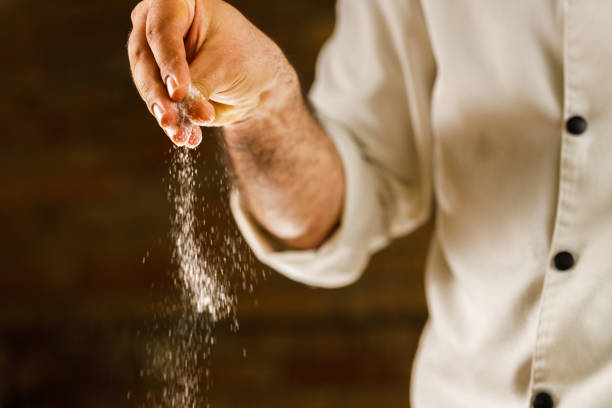The #1 Rated Blood Sugar Formula
Eliminating Salt in Cooking Prevents HBP

How does salt raise your blood pressure? Salt makes your body hold onto water. If you eat too much, the extra water in your blood means there is extra pressure on your blood vessel walls, raising your blood pressure.
Avoid Prepared Foods
Ready-to-eat foods make dinner preparation easy, but they account for 75% of the sodium in the American diet. They include:
- Prepared mixes
- Packaged rice dishes
- Soups
- Canned foods
- Frozen meals
- Packaged baked goods
- Fast food
- Looking closely at the nutrition facts label for the milligrams (mg) of sodium per serving. Be sure to note how many servings are in the package.
- Using products labeled "low-sodium," or "no salt added."
- Checking the nutrition labels of cereals, bread, and prepared mixes.
- Rinsing canned beans and vegetables to wash off some of the sodium.
- Using frozen or fresh vegetables in place of canned vegetables.
- Avoiding cured meats like ham and bacon, pickles, olives, and other foods prepared in salt.
- Choosing unsalted brands of nuts and trail mix.
Bring on the Fresh Produce
Fruits and vegetables are a great source of flavor and nutrition.
- Plant-based foods -- carrots, spinach, apples, and peaches -- are naturally low in sodium.
- Sun-dried tomatoes, dried mushrooms, cranberries, cherries, and other dried fruits are bursting with flavor. Use them in salads and other dishes to add zest.
Try Salt-free Cooking
Explore other flavors when you are cooking.
- Add a splash of lemon and other citrus fruits, or wine, to soups and other dishes. Use them as a marinade for chicken and other meats.
- Avoid onion or garlic salt. Instead, use fresh garlic and onion, or onion and garlic powder.
- Try different types of pepper, including black, white, green, and red.
- Experiment with vinegars (white and red wine, rice wine, balsamic, and others). For the most flavor, add it at the end of cooking time.
- Toasted sesame oil adds a savory flavor without added salt.
- Dry mustard
- Fresh chopped hot peppers
- A sprinkle of paprika, cayenne pepper, or dried hot red pepper
Help Yourself to Herbs and Spices
Herbs and spices provide a mix of flavors. If you are not sure what spices to use, do a taste test. Mix a small pinch of a spice or spice mix into a lump of low-fat cream cheese. Let it sit for an hour or more, then try it and see if you like it.
Try these flavors to liven up your meals without salt.
Herbs and spices on vegetables:
- Carrots -- Cinnamon, cloves, dill, ginger, marjoram, nutmeg, rosemary, sage
- Corn -- Cumin, curry powder, paprika, parsley
- Green beans -- Dill, lemon juice, marjoram, oregano, tarragon, thyme
- Tomatoes -- Basil, bay leaf, dill, marjoram, onion, oregano, parsley, pepper
- Fish -- Curry powder, dill, dry mustard, lemon juice, paprika, pepper
- Chicken -- Poultry seasoning, rosemary, sage, tarragon, thyme
- Pork -- Garlic, onion, sage, pepper, oregano
- Beef -- Marjoram, nutmeg, sage, thyme
Adjust to Less Salt
You will notice a difference when you first start cooking without salt. Fortunately, your sense of taste will change. After a period of adjustment, most people stop missing salt and start enjoying the other flavors of food.
Salt-free Recipe
There are many great tasting low sodium recipes. Here's one you can try.
Chicken and Spanish Rice
- One cup (240 mL) onions, chopped
- Three fourth cup (180 mL) green peppers
- Two teaspoons (tsp) (10 mL) vegetable oil
- One 8-oz (240 g) can tomato sauce*
- One tsp (5 mL) parsley, chopped
- One half tsp (2.5 mL) black pepper
- One and a quarter tsp (6 mL) garlic, minced
- Five cups (1.2 L) cooked brown rice (cooked in unsalted water)
- Three and a half cups (840 mL) chicken breasts, cooked, skin and bone removed, and diced
- In a large skillet, sauté onions and green peppers in oil for 5 minutes on medium heat.
- Add tomato sauce and spices. Heat through.
- Add cooked rice and chicken. Heat through.






